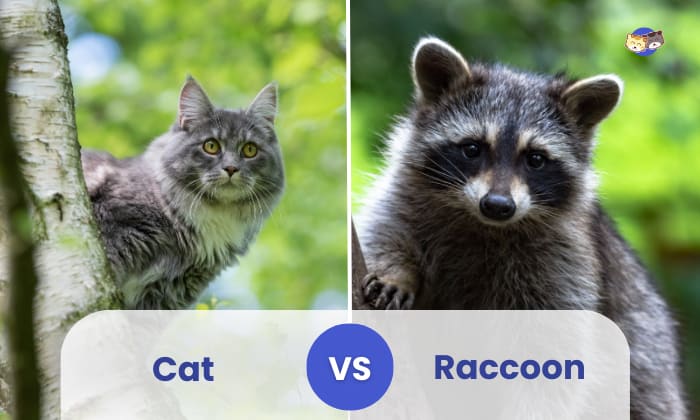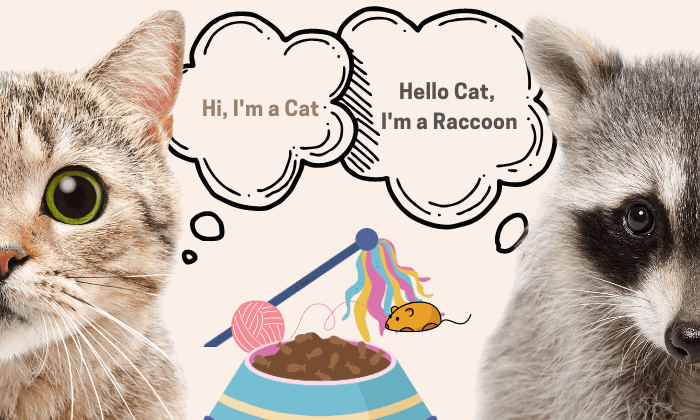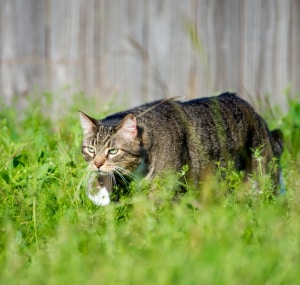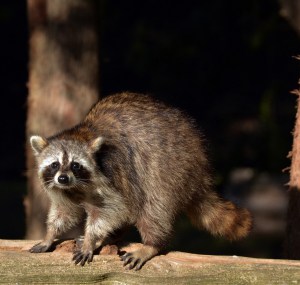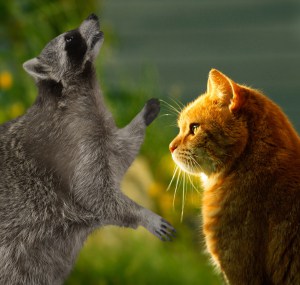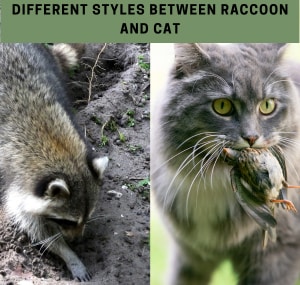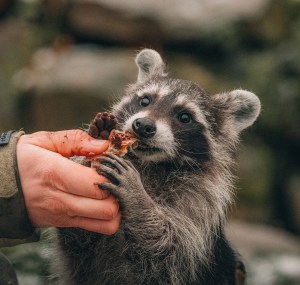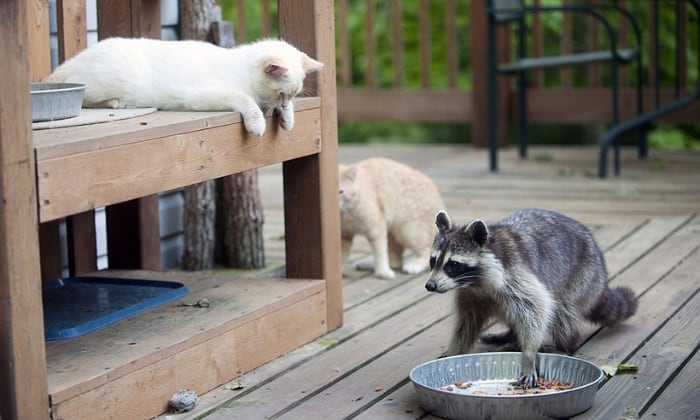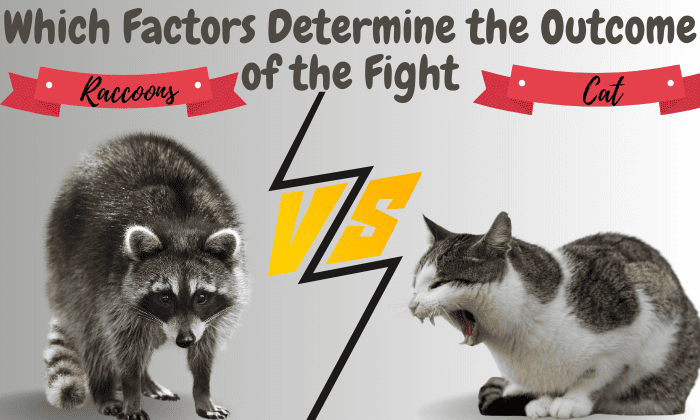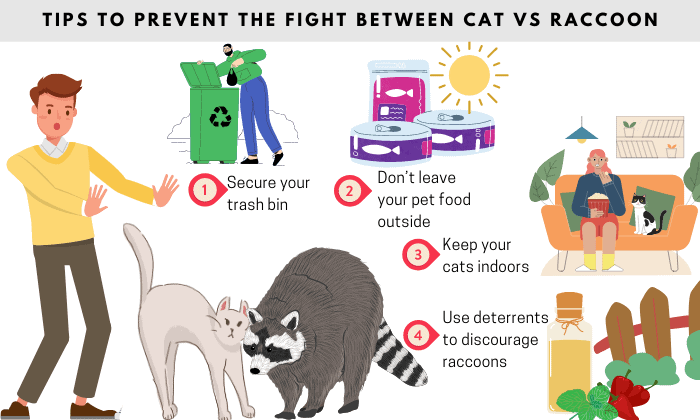Cats are territorial by nature. As such, they are prone to fighting other animals, especially those trespassing on the feline’s territory. So if a raccoon visits your yard to scavenge the trash, it’s highly likely the two animals will get into a fight.
Naturally, you would want your pet to be safe, so we get why you’d want to know cat vs racoon, who would win in a fight.
The ultimate outcome depends on the two animal’s size, age, health condition, and fighting experience. However, between the two, raccoons have a better chance of winning thanks to their larger size and fighting experience from living in the wild.
Table of Contents
Summary Table of Cats vs Raccoons
| Aspects | Cats | Raccoons |
| Size | Weight: 8–10 pounds, although some can reach 25 pounds
Length: 20 inches for females and 28 inches for males. Some large species, like the Maine Coon, can reach up to 40 inches. |
Weight: 12-36 pounds, although larger species can reach up to 50 pounds.
Length: 24-38 in, with males being bigger than females |
| Speed | Maximum speed: 30 mph
Average speed: 20 mph |
Maximum speed: 15 mph for a short while
Average speed: 10 mph |
| Sense | Eyesight: excellent during both daylight and nighttime. Can see objects up to 20 feet away.
Hearing: powerful Smell: 200 million scent receptors |
Eyesight: colorblind. Limited vision at night. Poor long-distance eyesight.
Hearing: strong, but not as cat’s Smell: estimated between 5 and 7 million scent receptors |
| Predatory behavior | Stealthy hunters: stalking, pouncing, and quick reflexes
Hunting tools: sharp teeth and claws, along with excellent senses. |
Will only hunt or scavenge any food sources available.
Hunting tools: strong jaws and front paws, sharp teeth |
| Habitat | Primarily indoors with their human companion | Wooded areas near human residence |
| Intelligence | Not as smart as raccoons | Smarter than both cats and dogs |
What Are They?
1. Cats
Cats are small carnivorous animals that were domesticated 10,000 to 20,000 years ago. However, they still retain their predatory instincts, so they would stalk, chase, and pounce on smaller animals they deem as “prey.”
Both wild and domesticated cats have a strong sense of territoriality. This compels them to become aggressive if sensing their territory is being threatened. Therefore, it’s rare to see cats and raccoons get along.
2. Raccoons
Raccoons are nocturnal animals that live in wooded areas and big cities alike across America and Europe. As scavengers, these animals wander around to look for fruits in the backyard or rummage through your trash bins for some leftover food.
Will a raccoon kill a cat? Although it’s unlikely, raccoons can kill a feline, especially if they’re desperate for food and the cat is still small.
Differences Between Racoon Vs Cat
1. Physical characteristics
With up to 36 pounds in weight, 38 inches in length, and 12 inches in height, raccoons are usually bigger than the average household and feral cats. Although some felines can reach 25 pounds, most only average around 8–10 pounds and rarely exceeds 28 inches.
From the difference in size, one can come to the conclusion that while cats are skilled hunters and have a strong predatory instinct, they may lose to a much larger raccoon. Therefore, these scavengers rarely perceive cats as threats and only become aggressive if challenged.
That said, cats have an edge over raccoons in terms of sight, hearing, and smell. For example, the former can see up to 20 feet away, whereas the latter has limited vision, especially at night.
2. Hunting behaviors
When it comes to hunting, cats and raccoons have two different styles.
Cats are known for their exceptional hunting skills, aided by their sharp teeth and claws, along with their excellent senses. They are considered “stealthy hunters”, using a combination of stalking, pouncing, and quick reflexes to catch their prey.
Meanwhile, raccoons are opportunistic hunters who will hunt or scavenge any food sources. They have strong front paws, allowing them to climb trees and dig through the soil for food. Their strong straws and sharp teeth also aid them in their hunt.
3. Habitats
Living in their natural habitats, raccoons might find themselves in unexpected fights to the death with other wildlife animals. Surviving after each fight will help them acquire essential skills and tricks.
Cats, on the other hand, are mostly raised indoors. Small battles with dogs or other cats might happen, but they still lack experience when facing wild mammals.
4. Intelligence
As opportunistic hunters, raccoons are more intelligent than cats, being able to adapt to various environments. They are also known for their resourcefulness, memory, and problem-solving ability. So they can have more tricks up their sleeve to gain an edge.
Who Would Win, a Cat or a Raccoon?
When raccoons fight cats, they have a better chance of winning due to their bigger body, diverse fighting experience, and better intelligence.
What about a larger-than-average feline like the Maine Coon? To tell you the truth, in a Maine Coon vs raccoon fight, the latter is still more likely to emerge as the victor.
Factors That Could Determine the Outcome of the Fight
- Size and Strength
As stated earlier, raccoons are larger than cats. This feature gives raccoons the upper hand when they’re in a fight requiring lots of strength.
- Speed and Movement Type
Cats got an amazing speed of about 30 mph, twice or three times that of raccoons (which ranges from 10 to 15 mph).
Cats can effectively stalk and capture their opponents with different types of movements (from slow, slinky walk to a full-on burst of speed).
- Age and health conditions
The scale can tip in the cat’s favor if it’s fighting against a young or injured raccoon. Likewise, if a raccoon is slowed down due to old age, it is much more likely to lose in its battle against a younger and healthier cat.
Tips to Prevent the Fight Between Cat Vs Raccoon
Seldom can a cat beat a raccoon in a fight. Thus, prevention is better than cure. See below for some ways to prevent them from fighting.
- Secure your trash bin
Food in your trash is the main reason that attracts raccoons to your home. They’ll keep visiting to scavenge food, so lock your trash cans to prevent any rummage.
- Don’t leave your pet food outside
Besides garbage, raccoons are also attracted to pets’ food. So if you feed your cats outside, remember to clean their eating area and bring their redundant food inside.
- Keep your cats indoors (or outdoors with your supervision)
There’s little possibility that your cat kills raccoon in a fight. Thus, vulnerable cats should be kept indoors. If you want to give them extra time playing in the garden, supervise them closely to prevent any chances of a confrontation.
- Use deterrents to discourage raccoons
To keep raccoons away from your property, use different natural and chemical deterrents, such as peppermint oil, cayenne pepper, or ammonia.
- Install a better fencing system
A better fencing system is not only good for blocking off raccoon access, but it’s also ideal for keeping your felines at bay.
Why do raccoons attack cats?
Raccoons come to your house for food. When they suddenly face your cats (who are territorial animals), they might attack them to defend themselves.
Sometimes when they find no food, raccoons will kill a kitten and eat it if they’ve spotted some in your area.
What to do when a raccoon attacks your pets?
Raccoon attacks on pets are relatively rare, but they can occur. If you witness racoons fighting your pet, it’s essential to act quickly to protect your pet.
You can try making loud noises to scare the raccoons or spray water at them to force them to let go of your pet. If these tricks don’t work, quickly ask for help from your neighbors or call for professional assistance from wildlife control organizations.
Remember, when in a fight, raccoons bite on cats and dogs. Since they can carry diseases, such as rabies, it’s important to get your pet to a veterinarian for medical attention.
What Animals Can Beat a Raccoon?
Raccoons might defeat household cats in a battle. But when in the wild, they are prey to many predators, such as foxes, bears, coyotes, wolves, cougars, etc.
Much like the fight between a bobcat vs. raccoon, the scavenger is the clear loser. This is because the red lynx has yet to be completely domesticated due to their unfriendly nature, making them potentially dangerous for even humans.
Conclusion
With advantages in physical strength and survival skills in nature, the raccoon stands a much higher chance of beating a house cat when they’re in a fight.
Knowing the outcome of “cat vs raccoon, who would win,” it’s crucial that you avoid putting your pet in a situation where they would need to fight for food or survival.
Follow the essential tips above to reduce any likelihood of seeing an unexpected battle between your cat and a raccoon (or even any other wild mammals who might enter your home).
Read more: Cat vs owl: who is winner?

I am Amy Sawy, a Doctor of Veterinary Medicine (DVM) graduate from the University of Kansas. y husband, Dr. Plummer, and I own a veterinary clinic in Phillipsburg, Kansas. In addition to my professional background, I am a devoted pet owner myself, with a household that includes dogs, rodents, and most notably, cats – a total of five felines in my home.
In 2020, I joined an organization as a professional writer, leveraging my experience and collaborating with my team to deliver the most valuable information for your cat’s care.


